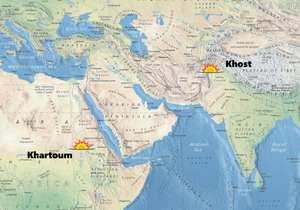Operation Infinite Reach facts for kids
Quick facts for kids Operation Infinite Reach |
|
|---|---|
| Part of the Afghan conflict | |

Map showing the two sites of attacks
|
|
| Location | Khartoum, Sudan 15°38′45″N 32°33′42″E / 15.64583°N 32.56167°E |
| Planned | 7–20 August 1998 |
| Target | Al-Shifa pharmaceutical factory and Afghan training camp |
| Date | 20 August 1998 |
| Executed by | |
| Outcome | United States failure
|
| Casualties | 6–50 militants killed |
Operation Infinite Reach was the name for American cruise missile attacks on al-Qaeda bases. These attacks happened at the same time in two different places on August 20, 1998. The U.S. Navy launched the missiles.
The strikes hit the al-Shifa pharmaceutical factory in Khartoum, Sudan. They also hit a camp in Khost Province, Afghanistan. These attacks were a response to al-Qaeda's bombings of American embassies. Those bombings happened on August 7 in Kenya and Tanzania. They killed 224 people, including 12 Americans, and injured over 4,000 others.
Operation Infinite Reach was the first time the United States openly said it was attacking a non-government group before they attacked again.
Contents
Why the Strikes Happened
The U.S. believed the al-Shifa plant had money ties to Osama bin Laden. This factory made more than half of Sudan's medicines. A soil sample from al-Shifa also seemed to contain a chemical used to make VX nerve gas, a dangerous chemical weapon.
Because of this, the U.S. thought al-Shifa was linked to bin Laden and his al-Qaeda group. They believed it was making chemical weapons for them. So, the U.S. destroyed the factory with cruise missiles. This attack killed or wounded 11 Sudanese people.
Controversy Over the Al-Shifa Strike
The attack on al-Shifa caused a lot of debate. After the strikes, many people said the U.S. evidence was wrong. Experts later agreed that the plant was likely not involved in making chemical weapons.
Attacks on Afghan Camps
The missile strikes on al-Qaeda's Afghan training camps had two main goals. The U.S. wanted to stop more attacks and kill Osama bin Laden. The strikes damaged the camps, but bin Laden was not there at the time.
Two of the targeted camps were run by Pakistan's intelligence agency (ISI). They were training fighters for Kashmir. Five ISI officers and at least twenty fighters died in these strikes.
After the attacks, the Taliban, who ruled Afghanistan, reportedly did not keep a promise. They had told Saudi intelligence chief Turki bin Faisal they would hand over bin Laden. Instead, the Taliban reportedly became even closer with the al-Qaeda leader.
Impact of the Operation
Operation Infinite Reach was the biggest U.S. response to a terrorist attack since the 1986 bombing of Libya. People around the world had different reactions. U.S. allies and most Americans supported the strikes. However, many people in the Muslim world (countries where Islam is the main religion) did not approve. They saw the attacks as being against Muslims. Extremist groups used this feeling to gain more support.
The attacks also failed to kill bin Laden. This made him seem stronger to some people in the Muslim world. More strikes were planned but never happened. A 2002 U.S. inquiry noted that Operation Infinite Reach was the only time the U.S. military or CIA directly acted against Bin Laden before the September 11 attacks.
After the Attacks
Reactions in the U.S.
U.S. news covered Operation Infinite Reach a lot. About 75% of Americans knew about the strikes by the evening of August 20. The next day, 79% of people said they had followed the story closely. In the week after the strikes, major news channels showed many stories about them.
Some polls showed that a number of people thought the attacks might have been partly to distract from other issues. A poll showed 47% thought the strikes would increase terrorist attacks. On the other hand, 38% thought they would lessen terrorism. Another poll found that 84% believed the operation would lead to a revenge attack on U.S. soil.
International Reactions
U.S. allies like Australia, Germany, the United Kingdom, Israel, and the Northern Alliance supported the attacks. However, countries like Cuba, Russia, and China were against them. The targeted nations and other Muslim countries also opposed the strikes.
German Chancellor Helmut Kohl said all countries needed to act strongly against terrorism. Russian President Boris Yeltsin said it was wrong to solve problems without trying all ways of talking and diplomacy first.
Al-Qaeda's View of Victory
Al-Qaeda saw the outcome as a win for them. The Taliban quickly announced that bin Laden had survived the attacks. This made him seem like a symbol of resistance against the U.S. in the Muslim world.
Bin Laden gained a lot of support in Pakistan. Books praising him were published, parents named their sons Osama, and his speeches were shared. Al-Qaeda also sold videos of the damage from the strikes in Islamic bookstores in Europe and the Middle East. A 1999 report said bin Laden "appeared to many as an underdog standing firm in the face of bullying aggression." The missile strikes also led extremist groups to plan more attacks.
Operation Infinite Reach also made bin Laden's friends support him more. It helped him gain more support from other armed groups. The attacks also helped al-Qaeda find new members and ask for money.
Images for kids
-
The U.S. Embassy in Dar es Salaam, Tanzania, after the August 7, 1998, al-Qaeda bombing
-
Excerpt from Mullah Omar's August 22, 1998, phone call with a U.S. diplomat
See also
- Foreign policy of the Bill Clinton administration
- History of Afghanistan (1992–present)
- Sudan–United States relations
- Timeline of United States military operations
 | Delilah Pierce |
 | Gordon Parks |
 | Augusta Savage |
 | Charles Ethan Porter |





